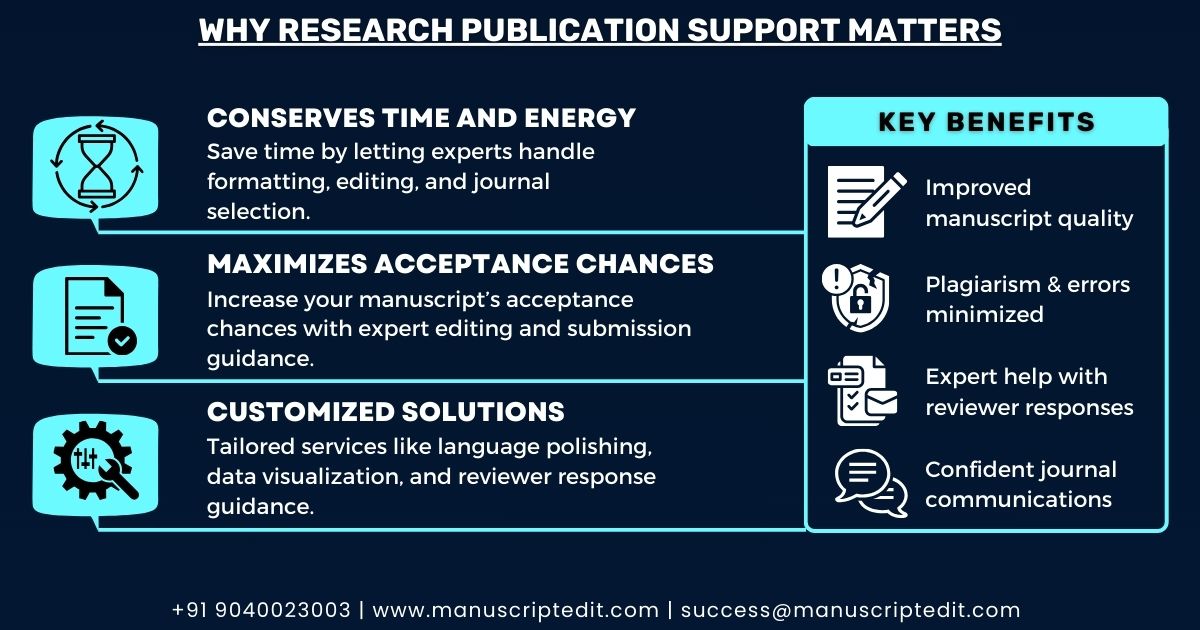|
Getting your Trinity Audio player ready...
|

Did you know that over 50% of rejected research papers are due to issues with integrity, such as data fabrication or plagiarism? Such errors damage a researcher’s credibility and reflect poorly on the scientific community. Also, there is already so much scrutiny with high-impact journals’ peer reviews and rules to get published that the competition itself is daunting. All of the above becomes even more intimidating if integrity breaches are included.
Keeping your research honest is very important from the time you begin planning your study until you publish it. Journals are now paying more attention than before, using advanced plagiarism detection tools and asking for transparent data sharing. In this blog, we look at publishing challenges while keeping research honest, give helpful tips to deal with these challenges and discuss how expert help can be a valuable resource.
Challenges in Research Publication
According to a global survey, 36% of researchers admit to witnessing some form of misconduct in their fields. Publishing research is not an easy task and presents many hurdles. The following are the most common problems scholars experience:
Choosing the Right Journal
Many researchers find it difficult to select a journal for their research scope and intended audience. Wrongly submitted journals lead to instant rejection. Studies have shown that close to 30% of manuscripts get rejected before they even enter the peer-review process due to poor journal fit.
Selecting a journal involves some consideration, such as the journal’s audience, the citation metrics, and whether it is likely to get accepted. If these considerations are not met, a lot of time is wasted, and publication is put off.
Manuscript Format and Proofreading Errors
Most journals have different format requirements. Grammar and formatting mistakes may give an impression that is not desirable, reducing your chance of acceptance. Even minor matters like inconsistent citation styles or poorly arranged figures lead to desk rejection. Most researchers underestimate the importance of meticulously following the submission guidelines and proofreading their work.
Responding to Reviewer Comments
Reviewer comments can be intimidating. Misunderstanding or failing to address feedback correctly can delay publication or even lead to rejection.
Example: Poor response to reviewer queries left one study to be sent for three rounds of revision before rejection. Researchers should take reviewers’ comments as an opportunity to learn and respond in an organized manner.
Ethical Issues
It is not easy to ensure ethical standards, but these are possible. Cases of plagiarism, data manipulation, or failure to seek participants’ consent can make the publication impossible.
Did You Know? More than 20% of journal editors report encountering suspicion of ethical misconduct in some submissions.
Sustaining Research Integrity Over
Barring these challenges, maintaining research integrity is a continuing process. From data gathering to analysis and writing, any slip can compromise the credibility of findings. Institutions and journals have lately emphasized the need for training in ethics in research to avoid these problems, but individual accountability is the bottom line.
Significance of Research Integrity for Success
Upholding research integrity is essential since it goes far beyond adherence to ethical principles and assures the research findings’ accuracy and pertinence. All readers, peers, and decision-makers depend on the published research to make the right decisions. A breach in integrity breaches that trust.
The Role of Journals in Keeping Integrity: Well-known journals show how vital integrity is by using different methods:
Advanced algorithms ensure that all submissions are original, plagiarism detection mechanisms.
Data Availability Mandates: Authors are asked to share their original data to back up their statements, which helps clarify things.
Ethical Evaluations: Many journals have ethics committees that closely scrutinize submissions to ensure compliance with ethics rules. Institutional Responsibilities Research institutions are essential in guiding researchers on best practices in conducting their research and resolving misconduct issues. More and more, workshops are being organized to examine ethical data management and responsible authorship.
Did you know? Since 2020, the Committee on Publication Ethics (COPE) reported that 23% of institutions have adopted formal integrity policies. Effects of Integrity Breaches
Retractions: journals withdraw articles in case of ethical lapses.
Professional reputation damage: Compromising authors suffer professional reputation damage.
Funding Implications: This will eventually result in a loss of grants, and lawsuits could be brought against them.
Why Research Publication Support Matters
Professional research publication support may be the best game-changer in your publishing career. Here’s why:

Conserves Time and Energy
Experts simplify the process by handling tasks like formatting, editing, and selecting a journal, allowing researchers to focus on what matters to them.
Maximizes Acceptance Chances
Customized services, like manuscript editing, increase submission quality and chances of acceptance
Customized solutions
Professional services offer personalized support, ranging from language polishing to data visualization.
Key Benefits
• Improved quality of manuscript
• Plagiarism and data errors minimized
• Expert help in handling responses to the reviewers
• More confident dealing with journal communications.
More Services
Some providers give services after publishing, like making articles more visible through SEO optimization or promoting them on social media. Others offer citation tracking and academic networking to help your research reach more people.
Custom Support Packages
Customized services generally involve the researcher’s particular needs in language editing, statistical analysis support, and comprehensive submission management.
Data Insight:
With publication help, researchers are much more likely to get accepted—40 % higher, in fact, than those who publish without any help.
Success Stories and Testimonials
Case Study 1: Overcoming Formatting Challenges
Challenge: A PhD student’s manuscript faced rejection due to inconsistent formatting.
Solution: Professional editing services reformatted the manuscript according to journal guidelines.
Outcome: The paper was accepted on the second submission and published in a high-impact journal.
Case Study 2: Navigating Peer Review
Challenge: A researcher struggled with responding to extensive reviewer feedback.
Solution: Expert coaching helped refine responses and revise the manuscript effectively.
Outcome: The paper was published within three months.
Case Study 3: Enhancing Ethical Standards
Challenge: A research team faced allegations of insufficient data transparency.
Solution: A publication support service helped them organize and share supplementary data, clearing ethical concerns.
Outcome: The paper was accepted and later cited in significant reviews.
Case Study 4: Boosting Article Visibility
Challenge: A published study wasn’t gaining citations due to low visibility.
Solution: Post-publication SEO optimization and targeted academic promotions increased the article’s reach.
Outcome: The study saw a 30% increase in citations within a year.
Case Study 5: First-Time Publication Success
Challenge: A new researcher lacked experience in manuscript preparation and journal communication.
Solution: Comprehensive support services guided the researcher through every step, from editing to submission.
Outcome: The paper was accepted on its first submission and received positive peer reviews.
User Queries: Best Practices for Research Integrity
How Do I Prevent Plagiarism in My Research Paper?
1. Paraphrase Properly: Understand the source material and say it in your own words.
2. Cite Every Source: Identify your source, including data, figures, and direct quotes.
3. Use Plagiarism Detection Tools: Programs like Turnitin or Grammarly can help detect any accidental similarities.
What Are the Best Practices for Ensuring Research Integrity?
• Follow the ethical rules of your school and specific journals.
• Document your research process in detail.
• Be transparent and respectful to all contributors.
How Do I Cite Sources Properly to Maintain Research Integrity?
• Adhere to the citation style that the target journal demands, for example, APA, MLA, or Chicago.
• Check references for accuracy and completeness.
• Use citation management tools like Zotero or EndNote to simplify the process.
What Steps Do I Need to Take to Ensure Ethical Treatment of Human or Animal Subjects?
• Obtain proper ethical clearance from the relevant committees.
• Get informed consent from the respondents.
• Ensure that data is anonymized and kept safe in a way that will guarantee confidentiality.
How Do I Guarantee Transparency and Replicability in My Research?
• Share raw data and methods
• Use detailed and reproducible experimental protocols
• Register your study protocols on the OSF.
Conclusion
Publishing research honestly can indeed be a very fulfilling but often challenging journey. Researchers typically face various problems, including selecting the right journal, correcting formatting problems, ethical issues, and other matters such as peer reviewing. Fortunately, with such professional help in publishing one’s research, the route ahead becomes much more straightforward to ensure that the work stands out with the finest quality.
Once more, when researchers take their time to think about these challenges and ask for help from experts, they increase the success rate and provide valuable information in their field. Are you prepared to share your research with confidence and make a difference? Then contact Manuscripedit today to get complete support throughout the publication journey! Our friendly experts are ready to assist you as you work with your manuscript and guide you through a peer review. Let us facilitate the publishing process so you don’t have to, ensuring better research impact. Get the complete details at Manuscripedit.



